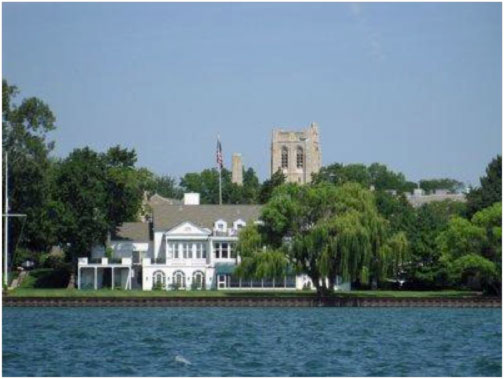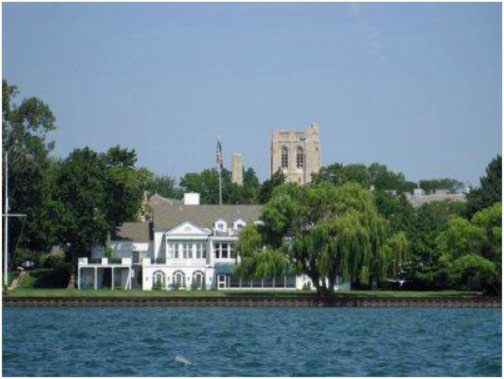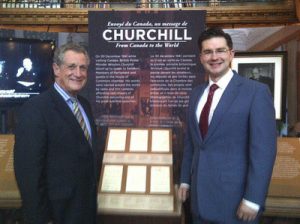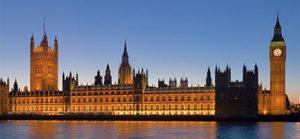
Bulletin #48 - Jun 2012
Semi-Annual Churchill Society Dinner Held in Grosse Point, Michigan

May 21, 2012
Professor Warren Kimball speaks on “Churchill and Roosevelt.”
MICHIGAN
By Dick Marsh & Robert Pettengill
GROSSE POINT MICHIGAN, 9 May 2012—The Winston Churchill Society of Michigan met last month at “The Little Club” on the shores of Lake St. Clair.
 The Little ClubA record 92 people were in attendance for the event, including five new members, and guests.
The Little ClubA record 92 people were in attendance for the event, including five new members, and guests.

2024 International Churchill Conference
Grosse Point was chosen this year as it is the tradition of the Society to rotate it’s meetings around the three corners of the Michigan triangle; Ann Arbor to the West, Bloomfield to the Northwest, and Grosse Point to the East.
Society President Dick Marsh first introduced Lee Pollock, Executive Director of the Churchill Centre, then Warren Kimball as the featured speaker for the evening.
Lee began the evening’s proceedings by speaking about The Churchill Centre’s exciting new initiative to create a library, education center, and exhibition space at The George Washington Library in Washington, D.C.
Well known to most members for his role as academic advisor to The Churchill Centre and as a senior editor of Finest Hour, Mr. Kimball is Professor Emeritus at Rutgers University. He is the leading expert on Roosevelt and Churchill’s alliance during World War II and has written several books including his three volume work Churchill and Roosevelt: The Complete Correspondence and, Forged in War: Roosevelt and Churchill.
Professor Kimball spoken on the many complexities of the wartime relationship, with subtexts of the changing world power structure; the United States clearly in the ascendency, the declining British Empire, and although not obvious at that time, the eventual rise of the Soviet Union.
Kimball then discussed the geopolitical situation in post-war Europe. In assessing blame for the Soviet Union’s occupation and oppression of Eastern Europe, Professor Kimball emphasized that first on Churchill’s mind during the war years was defeating Germany and maintaining The Grand Alliance, which made it possible.
The way in which Poland was treated became the touchstone for post war relationships. At Yalta, all Churchill and Roosevelt could do was to ask Stalin for concessions to make the settlement more palatable to their constituents back at home, knowing that it was questionable whether Stalin would ever implement them.
What was achieved in the Post war settlement was the avoidance of war and as Churchill wrote: “keeping the world engine on the rails”.
At the conclusion of his talk, Professor Kimball asked, “If his presentation on Churchill was too negative?” and a spirited Q&A ensued.
Robert Pettengill then briefly presented an update on The Society’s “education outreach” program. The Society was disappointed that no recent responses were received to an outreach letter that was sent to 173 educational institutions, offering to put on a Churchill unit in a history class session. Going forward the emphasis for outreach will be on personal connections between Society members and teachers.
Society President Dick Marsh closed the meeting with a reading of Duff Cooper’s poem about Winston Churchill:
When ears were deaf and tongues were mute,
You told of doom to come,
When others fingered on the flute,
You thundered on the drum.
When armies marched and cities burned
And all you said came true,
Those who had mocked your warnings turned
Almost too late to you.
Then doubt gave way to firm belief,
And through five cruel years
You gave us glory in our grief,
And laughter through our tears.
When final honours are bestowed
And last accounts are done,
Then shall we know how much was owed
By all the world to one.
Subscribe
WANT MORE?
Get the Churchill Bulletin delivered to your inbox once a month.




